David Cameron defends China trade mission
- Published
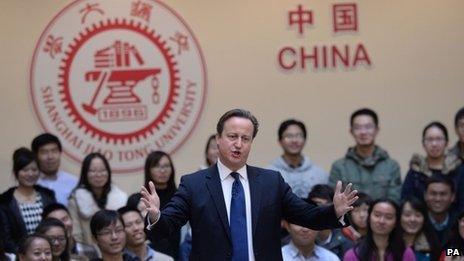
British Prime Minister David Cameron has defended his trade mission to China after criticism in the Chinese media.
One state-run newspaper cast doubt on the "sincerity" of Mr Cameron's diplomacy amid ongoing anger about his meeting last year with the Dalai Lama.
And it suggested China did not need better relations with the UK as it was no longer a "big country".
Mr Cameron said the trip had seen £6bn in trade deals and "substantial discussions" with China's leaders.
In a strongly-worded editorial, the nationalist Global Times newspaper said Mr Cameron was motivated by "self-interest" and expressed anger over the UK's stance on Hong Kong politics and Beijing's air zone row with Japan, as well as the Dalai Lama issue.
"The UK is highly 'replaceable' in China's Europe diplomacy," said the newspaper.
"The UK is no longer any so-called 'big country'... it is an old European country suitable for travel and study abroad, with a few good football teams."
David Cameron's attempt at Mandarin was met with applause
Other newspapers joined in with the criticism, fuelled by anger over access to British visas, although some welcomed efforts to improve bi-lateral trade relations.
Mr Cameron, who is on the second of a three-day visit to the country with more than 100 British business people, dismissed the attacks.
He told BBC News: "I must have missed the bit about the football teams. I would just prefer to go on the figures.
"This is a visit that has delivered almost £6bn worth of deals. It is a visit that comes on the back of an eighteen month period where we have seen more Chinese investment into Britain in the last 18 months than in the previous 30 years.
And also it is a visit where we have seen very good, high level, substantial discussions both with the premier and with the president - the premier who described the partnership as indispensable. So I will stick with the facts and the figures."
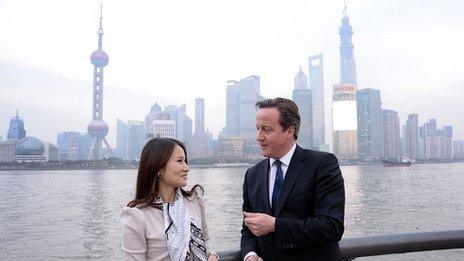
David Cameron with gaming firm Rekoo's vice president Lisa Pan in Shanghai
He added: "You don't have to know all the facts and figures about China to know that China's economic rise is going to play a huge role in the world and Britain should be in there pitching for business, pitching for investment, pitching for deals, securing jobs at home."
Among the latest trade deals to be announced are a £120m agreement to give UK healthcare firms access to the Chinese market and an agreement to allow British film makers greater access to China's heavily-restricted, but rapidly expanding, domestic cinema market.
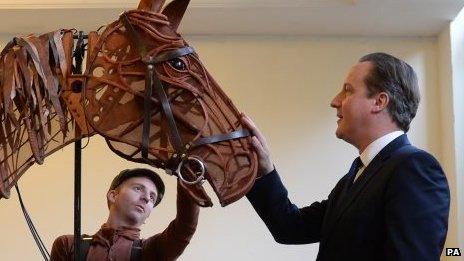
The PM met Matthew Forbes with the 'War Horse' from the West End Show at the Shanghai Exhibition Centre
Mr Cameron has also used the trade mission to bang the drum for an EU-China free trade deal.
Speaking after a meeting with Chinese Premier Li Keqiang on Monday, he said: "Some in Europe and elsewhere see the world changing and want to shut China off behind a bamboo curtain of trade barriers. Britain wants to tear those trade barriers down."
He added: "I've said to Premier Li that I will champion an EU-China trade deal with as much determination as I'm championing the EU-US trade deal."
David Cameron has promised to create a "partnership for growth and reform" as he visits China on a trade mission with more than 100 UK business leaders
But a spokesman for the European Commission rejected Mr Cameron's call, saying the EU and China were already discussing a possible investment agreement and should stick to that for now.
"We believe that it is premature at this stage to discuss a free-trade agreement with China," the spokesman added.
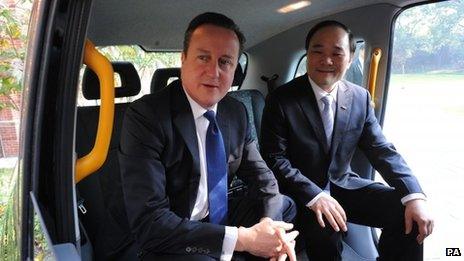
London's black cabs could soon be operating in Shanghai
There is resistance to a free trade deal in some EU nations, amid fears it will open the door to a flood of cheap imports.
Mr Cameron has also been promoting Britain's universities to Chinese students.
"It is very important for you to know that there is no limit, no artificial limit, to the number of students who can study in Britain," he told an audience of students at Shanghai Jiao Tong University
"You have to have an English qualification and a place at at British university and then you are welcome."
Mr Cameron told the students he had raised human rights issues in his talks with Chinese leaders, although he did not mention Tibet in the list of global hot spots he said they had discussed.
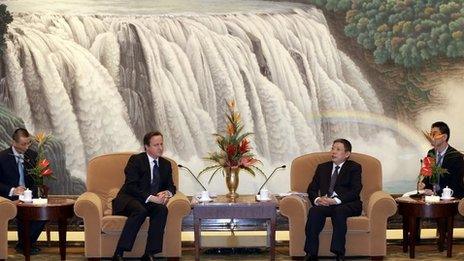
The UK prime minister held talks with Shanghai's mayor Yang Xiong
He also joked about the weekly "torture" of prime minister's question time in the Commons, but added that it was an important "test" that kept prime ministers "on their mettle".
And he said efforts were under way to set up a "joint shop window" so that Chinese tourists could apply for a British visa at the same time as applying for a Schengen visa, which grants them access to the rest of the EU.
"We need to make it easier for you, in terms of the visa situation, and we are working on a solution," he said.
- Published3 December 2013
- Published3 December 2013
- Published2 December 2013
- Published2 December 2013
- Published15 November 2013
- Published3 December 2013
- Published14 October 2013
- Published14 October 2013
- Published30 November 2013